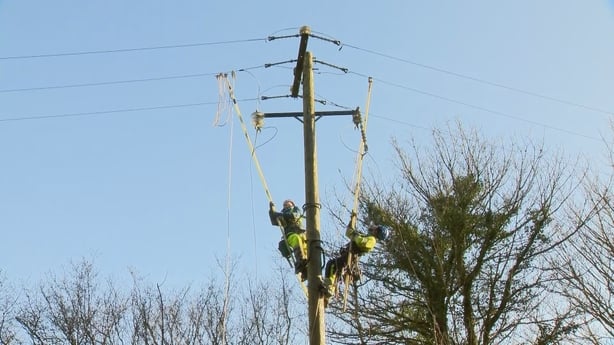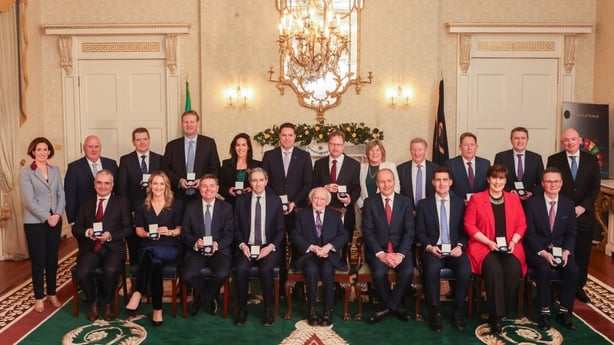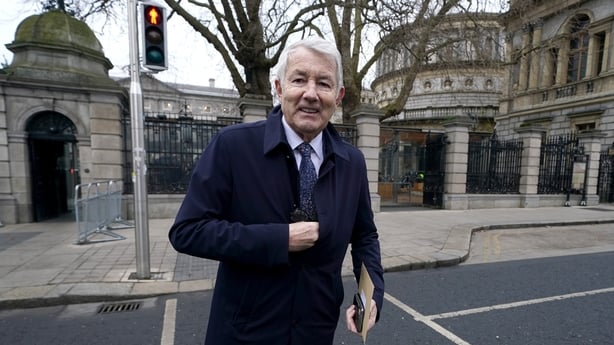It was hardly an auspicious start. Firstly, the election of the Taoiseach was postponed by a day, after unprecedented scenes in the Dáil.
Those scenes were a direct result of Fianna Fáil and Fine Gael’s apparent acquiescence to a proposal by the Regional Independents to get opposition speaking time, despite having been part of government formation talks.
Then, storm clouds formed on the horizon, quite literally.
Storm Éowyn was forecast to first make landfall in the early hours of January 24, meaning newly minted ministers had to rush home to their constituencies.
The storm proved as bad as predicted, and at time of publication, there are still communities without power, heat, and water, more than a week after they were cut off.
While on a visit to Castlerea in Co Roscommon, the Taoiseach faced an angry response from several women in the community.
Julie Malone told Micheál Martin that they needed more help.
The mother of three small children said it was "very frustrating" to be without power, heat and water for five days.
She described her situation as a "prime example of rural Ireland [being] forgotten about again".
Mr. Martin also faced criticism from Rachel Connolly, a business owner in Castlerea, who told the Taoiseach she’d lost the contents of her fridge and freezer three times in the past year.
The Taoiseach told her that the National Emergency Coordination Group had met prior to the storm and that plans were in place, to which Ms Connolly responded; "those plans didn’t work".
This was not Mr Martin’s Kanturk moment, as the Taoiseach retained his composure, but it is an uncomfortable situation in which to find himself, barely a week into the job.
Last Thursday, Noel Loftus from St Attracta’s National School in Ballaghaderreen told Drivetime that 330 people remained "locked out" of the school because it had no power, and no return date on the horizon.
He spoke passionately about children with special needs or from disadvantaged backgrounds missing out on 11 days of school, which he described as an oasis where children can feel safe, get a hot meal and are used to the routine.
In a follow up with Mr Loftus, he said he was delighted to get calls from local TDs, the Department of Education and the ESB after his media interviews.
He said the school was reconnected that night.
Mr Loftus said: "I do firmly believe, unless we went on the media... we’d still be closed.
"We had no communication by anyone. Nobody. The only information I had at any time was the ESB power check app. There was no contact from the Department [of Education]."

Mr Loftus says the Government needs to give thought to how critical infrastructure is prioritised in future.
He asked: "Instead of the Government opening up hubs to recharge phones and get tea - the natural hub in the community is the school, why not reopen the school?,
St. Attractas in Ballaghaderreen is a DEIS 1 disadvantaged school, and every day lost is a challenge, according to Mr Loftus.
"Covid created a deep scar...that took a long time to be remedied. Now that scar has reopened for some deprived students," he said.
He said while many children were "delighted to be back, and we’re delighted to have them. But attendance is down. Now we have to reinvigorate the families to get the children to school".
"The longer a school is closed, for schools like this, the harder it is to get [all students] back," he added.
For a Government and a Taoiseach that values education, this is not what they will want to hear.
Then, there is the gender issue.

Fianna Fáil has just one senior Cabinet minister who is a woman; Norma Foley, while Fine Gael has two; Helen McEntee and Jennifer Carroll MacNeill.
Responding to criticism of the gender imbalance, Mr Martin said he would correct it with the appointment of junior ministers.
However, that did not come to pass.
On Wednesday, when the 23 juniors were unveiled, it transpired that just six of them are women, three of whom we knew about already; Mary Butler, Hildegarde Naughten and Marian Harkin and one of whom is staying put; Emer Higgins.
Fianna Fáil promoted Cavan-Monaghan TD Niamh Smyth and Carlow-Kilkenny TD Jennifer Murnane O’Connor.
Doubtless capable women, but an outsized burden, one would think, if just two women are charged with righting an imbalance among 23 junior ministers.
Rachel Coyle, Head of Campaigns and Mobilisation with the National Women’s Council, said: "It is very disappointing to see that following the decrease of women in the Cabinet from four to three, the Government failed to address this significant gender imbalance in Government and only appointed six women as Junior Ministers amongst the record [high] number of 23."
Read more: FF, FG reject gender equality failure in minister picks
While Aldagh McDonogh, chair of Women for Election, said: "It is very disappointing again to see that the Taoiseach and Tánaiste have not prioritised a gender balance among the Ministers of State...With just 6 women out of the 23 Ministers of State, there is a reduction in percentage terms from the last Government."
She added: "There are serious questions to ask of this new Government about the rationale of continuing to exclude women’s voices, expertise and lived experience from Government decision-making levels."
Now the Government will (and has) argued that all the parties complied with the requirement that 40% of candidates in Election 24 were women, but observers suggest that some female candidates for the General Election were added to the ticket to fulfil the 40% quota, rather than having regard to the likelihood of the particular candidate’s ability to win the seat.
Returning to the speaking rights issue, the matter was the focus of the newly formed Dáil Reform Committee on Thursday and yesterday.

A new proposal to try and resolve the impasse involved TDs Michael Lowry, Gillian Toole and Barry Heneghan (the three members of the Regional Independent Group (RIG) without ministerial roles) joining forces with Danny Healy Rae, Carol Nolan and Mattie McGrath as part of an unaligned technical group in opposition.
Under this new plan, the group would not take speaking time away from the opposition, but the opposition still rejected the proposal, essentially saying you can't have it both ways.
Opposition parties ask how the RIG can be in opposition, while having negotiated a programme for Government with Fianna Fáil and Fine Gael.
Cian O’Callaghan, Social Democrats Deputy Leader, said: "The Government are doubling down on stroke politics."
The meeting continued yesterday, but speaking after, Paul Murphy, People Before Profit TD, said the new Government proposal was even worse than the previous one.
He said: "The truth is we went backwards...the proposal they have currently tabled is even worse than the proposal that they tabled last night, it’s literally just an opposition technical group just called something different.
"So, this joke of pretending that these people who are in government ... are not in government, trying to have their cake and eat it."
At the heart of this, is the re-emergence of Mr Lowry as a major player in government negotiations.
First days of new Government idyllic compared to 2020 - analyst
Last week, Mr Murphy referred to Mr Lowry as a kingmaker, while Sinn Féin’s Pearse Doherty spoke about the "grubby deal" negotiated by the government with Mr Lowry.
Yesterday evening, Sinn Féin’s Pádraig Mac Lochlainn said the Irish people would not be taken for fools, adding: "Where we are going now is Alice in Wonderland with the language."
The Donegal TD asked: "How does Michael Lowry, one TD, have so much power over Government?"
Responding to the apparent impasse, a spokesman for the Government Chief Whip said; "The Government is disappointed that while negotiations and mediation were ongoing, the opposition chose to dismiss the proposal, while the Government remains open to positive engagement."
One seasoned observer familiar with the workings of government believes that the first days of this Government are idyllic in comparison to five years ago.
They point to the short-lived period (17 days) Barry Cowen served as Minister for Agriculture after controversy over a former drink-driving ban resurfaced.
They also point to the so-called Golfgate saga which saw serious heads roll, including that of Dara Calleary as Minister and Phil Hogan as Commissioner.
The current difficulties, do not compare to that, says the analyst.
They also say the voters do not care about speaking rights but say what is more important is what the Government will do next.
They fear that with one coalition partner in for the fourth time, and the other for the second, (or more if you count confidence and supply) where is the innovation, energy and new ideas?
It has been a tough ten days for the Government since it was formed.
It still has to grapple with the housing crisis, significant challenges in the health service, serious problems housing migrants and all this against the backdrop of global instability and an uncertain future relationship with the new US president.
There is work to be done.







